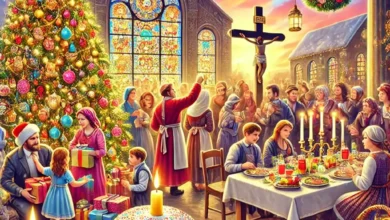
What Is the True Meaning of Easter? Why Is it Celebrated?
Easter is an annual Christian holiday celebrating the resurrection of Jesus Christ.
This festival is traditionally held on the first Sunday after the first full moon after the vernal equinox. Its exact time is determined by special tables that correspond to the Gregorian calendar in Western churches and the Julian calendar in Orthodox churches.
Easter is also known as “Easter Sunday” which is a day specifically dedicated to the commemoration of this celebration.
Biblical origins of Easter
Referring to the New Testament, the International Encyclopedia of the Bible states that the word “Easter” does not specifically appear in the Bible:
“Although the King James Version uses the word Passover instead of Passover in Acts 12:4, the Revised Version (British and American) correctly translates it as Passover.
There is no indication of the celebration of Easter in the New Testament, although some may see a reference to it in 1 Corinthians 5:7.
Jewish Christians in the early church continued to celebrate Passover and considered Christ to be the true Passover lamb. It naturally became the commemoration of the death and resurrection of our Lord, or the feast of Easter.”
What does Easter mean and where did it come from?
According to Easton’s Bible Dictionary, the name “Easter” is derived from “Eostre,” “which is originally a Saxon word (Eostre) referring to a Saxon goddess who was honored around the same time as Easter.” Passover, sacrifices were offered.
Another possibility is the word “Easter” (eostur, eastur or ostara) in Old Norse, meaning “season of sunrise” or “season of rebirth”. The word “east” also comes from the same roots. In this case, Easter is associated with the change of seasons.
A newer and more complex explanation points to the Christian context of Easter rather than pagan origins.
The original Latin name for Easter week was “hebdomada alba” or “white week”, while the Sunday after Easter was called “Dominica in albis” because of the white robes of the newly baptized. The word “alba” in Latin means both white and dawn.
The ancient Germanic people made a mistake in their translation and instead of the plural word for white, they used the plural word for dawn, “ostarum”. From “ostarum” comes the German word “Ostern” and the English word “Easter”.
What event happened on Easter?
Easter is celebrated by Christians to commemorate the resurrection of Jesus Christ from the dead, as recorded in the New Testament of the Bible. According to Christian beliefs, Jesus was crucified on Good Friday and rose from the dead three days later, on Easter Sunday, symbolizing victory over sin and death.
According to New Testament accounts, Easter Sunday began with the dawn of a new day, following the tragic crucifixion of Jesus on Good Friday.
The women who followed Jesus, including Mary Magdalene, Mary the mother of James, and Salome, went to the tomb where Jesus had been laid at sunrise.
Upon entering, they found that the stone at the entrance had been rolled away and the grave was empty.
This important discovery was accompanied by the appearance of angels who announced the startling news: “He is not here; He is risen, as he said” (Matthew 28:6). In terror and wonder, the women rushed to the disciples to share this incredible news. Meanwhile, Jesus himself appeared to Mary Magdalene near the tomb, and later to other disciples, including the two disciples on the road to Emmaus and the disciples gathered in Jerusalem.

The resurrection of Jesus Christ on Easter Sunday is the cornerstone of the Christian faith, which represents the fulfillment of God’s plan for salvation and the promise of eternal life to believers.
Easter is a day full of joy and hope, as Christians celebrate the victory of light over darkness, life over death, and the triumph of God’s love for humanity. Easter Sunday is a profound reminder of the transformative power of faith and the enduring message of hope that resonates through the ages.
Easter is considered the most important and happiest celebration in the religious calendar of Christians. This is a time for Christians to reflect on the significance of Jesus’ sacrifice and the promise of eternal life. The resurrection is seen as a fundamental principle in Christianity that emphasizes the hope and salvation offered through faith in Jesus Christ.
Why do Christians celebrate Easter?
The most important reason Christians celebrate Easter is the victory of Jesus Christ over death. His resurrection means eternal life for all who believe in him.
Also, Easter means a complete confirmation of all that Jesus taught and preached during his three years of ministry. If he didn’t rise from the dead or just die and come back to life, he would be thought of as just another teacher or prophet.
However, His resurrection refuted all of this and provided the final and irrefutable proof that He is the Son of God and has defeated death forever.
The resurrection of Jesus Christ from the dead is the core of the Christian gospel. Apostle Paul says that if Christ has not risen from the dead, our preaching and hope are in vain (1 Corinthians 15:14). Certainly, without the resurrection, there would be no Christian preaching and faith.
The apostles of Christ as shown in the Gospel of John, until they met the resurrected Christ, remained a discouraged and hidden group for fear of the Jews. They were in complete despair until they met the resurrected Christ (John 20:19). Then they touched the nail and spear wounds of Jesus; They ate and drank with him. The resurrection became the foundation of all their words and actions (Acts 2-4): “For the Spirit has neither flesh nor bones, as you see that I have” (Luke 24:39).
The connection between the Easter Bunny and Christianity
The connection between the Easter bunny and Christianity dates back to the 13th century in Germany.
The Germanic people, known as Teutons, worshiped pagan gods and goddesses. One of these goddesses was Ostra (also known as Stara or Ēostre). She was revered as the goddess of fertility and spring. The root of the word “Easter” is derived from the name of this goddess.
Because of the rabbit’s propensity to procreate, this animal became a symbol for Ostra. In 595 AD, Pope Gregory sent Roman monks to Christianize the Anglo-Saxons. The Anglo-Saxons, like their German ancestors, celebrated Ostra. After their conversion, they adopted the celebration of the resurrection of Jesus Christ at Easter, while continuing to celebrate the rebirth of spring and the symbol of the rabbit.
In other words, with the passage of time, spring celebrations were mixed with Christian celebrations, and the rabbit, as a symbol of fertility and rebirth, gradually became associated with the celebration of Easter. It is not directly related to the concept of resurrection and new beginning in Christianity, but is more a reflection of pre-Christian spring traditions.
Bible verses about Easter and the resurrection of Jesus Christ
1 Peter 1:3: “Praise be to the God and Father of our Lord Jesus Christ! Through his great mercy, he made us born again to a living hope through the resurrection of Jesus Christ from the dead.
John 11:25: Jesus said to him: “I am the resurrection and the life.” Whoever believes in me, though he dies, he will live.”
Romans 10:9: “For if you confess with your mouth that Jesus is Lord, and believe in your heart that God raised him from the dead, you will be saved.”
Romans 8:11: “And if the Spirit of Him who raised Jesus from the dead dwells in you, the same God who raised Christ from the dead will also give life to your mortal bodies through the Spirit who dwells in you.”
Acts 17:31: “For he has appointed a day in which he will judge the world in righteousness by a man whom he has chosen, and he has confirmed him over all people, having raised him from the dead.” Is.”
Romans 6:4: “Therefore, we were buried with him through baptism into death, so that just as Christ was raised from the dead by the glory of the Father, we too might walk in newness of life.”
Romans 14:9: “For this Christ died and rose again, that he might be Lord over the dead and the living.”
Today in the article : What Is the True Meaning of Easter? Why Is it Celebrated? We reviewed useful information about the Bible and the way of Jesus. If you wish, you can view other articles of Ali Vahidi about Christianity





